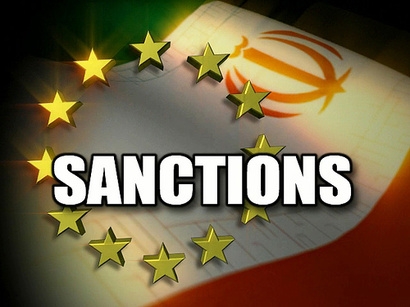ID :
259483
Tue, 10/16/2012 - 08:32
Auther :
Shortlink :
http://m.oananews.org//node/259483
The shortlink copeid
State Department: U.S. welcomes EU's adoption of significant new sanctions against Iran's government

Azerbaijan, Baku, Oct. 16 /Trend S.Isayev/
The U.S. obviously welcomes the adoption by the European Union of significant new sanctions against the Iranian Government in response to the Iranians' continued violation of their international obligations regarding their nuclear program, State Department spokeswoman Victoria Nuland said at a daily press briefing in Washington.
The European Union agreed to impose new sanctions on Iran on Monday to increase pressure over its disputed nuclear program, according to German Foreign Minister Guido Westerwelle.
The bloc had been expected to approve new restrictions against Tehran's banking sector, industry and shipping, in one of the toughest pushes against Iran by Europe to date.
The sanctions come amid mounting concerns over the Islamic Republic's military intentions and the failure of diplomacy to solve the atom stand-off.
"This action further strengthens the international efforts to persuade Iran to engage constructively and address the concerns of the international community," Nuland said.
"Iran knows what it needs to do. It has an opportunity to do it. It just needs to make the choice. These sanctions that the EU put forward today were in the categories of financial sanctions, trade sanctions, energy, transport; obviously they are coordinated," the spokeswoman noted, adding that the U.S. works very closely with the P5+1 group, that is doing the talks with Iran regarding its nuclear program.
European Union's foreign policy chief Catherine Ashton said on Monday that negotiations with Iran over its nuclear program could move forward very soon, adding that there is "room" for holding new talks.
The new measures against Iran mark a significant change of policy for the EU, which has so far focused on targeting specific people and companies with economic restrictions.
It has traditionally lagged the United States in imposing blanket industry bans, wary of punishing citizens while inflicting pain on governments.
But pressure on Iran is already doing significant damage to its economy, in part due to an oil embargo levied by the EU this year and Washington's new financial sanctions. Iran's rial currency has lost a third of its value in the past two weeks.
Iran insists its nuclear work has only peaceful dimensions and has refused in three rounds of talks since April to scale it back unless major economic sanctions are lifted.
But governments in Europe and the United States have refused to do so and, instead, are tightening the financial screws against Tehran as fears grow that the nuclear dispute could envelop the Middle East in a new war.
Do you have any feedback? Contact our journalist at agency@trend.az





